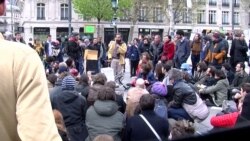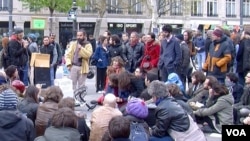The massive anti-terror demonstrations at the Place de la Republique are history. Make way instead for a pair scantily clad women, mock fencing on a recent sunny evening. Nearby a group of Algerian Berbers wave flags and listen to songs from their native Kabylia.
The more serious-minded head to a corner of the iconic Paris square now devoted to political gatherings. It’s here where a group is carving out a new constitution. And where a woman speaks tearfully about the lack of democracy in the Republic of Congo, as people seated cross-legged on the concrete waggle hands in agreement.
Grassroots movement
Heading into its fourth week, France’s Nuit Debout —or “Up all Night” — defies easy stereotypes. Born last month from a youthful protest against proposed labor reforms, it has morphed into a leaderless and hodgepodge citizens’ movement aimed to occupy, to recreate and to offer a grassroots voice of at least one slice of the French population.
“It’s totally anarchic in the good sense of the term,” said theater student Jean Briault, 25, a regular Nuit Debout goer. “I personally want to finish with capitalism.”
Some observers compare it to the "Occupy" movement in the United States or the "Indignados" uprising in Spain. Others draw reference to the May 1968 uprisings that left an indelible mark on France.
Still others poke fun at it. Le Monde newspaper cartoonist Xavier Gore depicts a bunch of penguins gathered with the tagline, “Let’s meet nightly until we can figure out why we’re here.”
“Nuit Debout is a bit complex to define,” said political scientist Bruno Cautres, of the Centre for Political Research at Sciences Po in Paris, of the largely leftist movement.
“It’s trying to invest new forms of democracy and reinvent what it means to be a leftist in France,” he added.
Police stand guard on the edge of the square, some holding riot shields. Sporadic clashes between police and hard-core protesters have given it an ugly edge.
Youth discontent
Still the movement that has attracted thousands in towns across France — and even spilled across French borders — remains a largely peaceful expression of youth discontent.
“We don’t trust the people leading us any more,” said university student Joy Gromil. “What we are trying to find is not a new leader, but a new way of running the country.”
There are plenty of reasons feeding the restlessness, starting with the country’s unpopular president, Francois Hollande. Thousands of students have taken to the streets to protest proposed labor reforms floated in a wider bid to turn around the country’s struggling economy.
Hollande has called Nuit Debut “legitimate,” yet his remarks last week suggested it was merely a youthful phase.
“I was once 20 years old, and I was also involved in a movement because there were injustices and inequalities and the world was not going the way it should,” he said on TV.
Many center-right politicians are less generous, criticizing the government for letting daily sit-ins continue, despite France’s ongoing state of emergency.
Still other prominent figures are making their pilgrimage to Republique square, including far-left French firebrand Jean-Luc Melenchon and former Greek finance minister Yanis Varoufakis.
“We need to go to the Place de la Republique,” conservative politician Nathalie Kosciusko-Morizet told the weekly Journal de Dimanche, in a rebuttal to fellow center-right lawmakers. “A generation is asking questions.”
Not everyone stays. Conservative philosopher Alain Finkielkraut beat a hasty retreat last Saturday under a hail of boos and insults, sparking questions about Nuit Debout’s tolerance of diversity.
Still a 'bourgeois' movement
Others are embraced. A woman from the Republic of Congo carried a banner against prisoner abuses in her country, while an unwashed 44-year-old man sporting earrings and a ponytail said he was fighting for poverty.
“The youth make sense to me, it’s important to defend their cause,” said the man, who gave only his street name, Drake.
Still, the movement’s reach remains limited. Nuit Debout has yet to galvanize youngsters from France’s gritty suburbs that exploded into violence a decade ago.
“The movement that occupies the Place de la Republique is much more a movement of educated, bourgeois, urban people — which is not at all the sociology of the banlieues,” analyst Cautres said.
And while a recent OpinionWay poll found that 70 percent of French youth support the movement, only one-quarter are willing to stay up all night.
For many Parisians, Nuit Debout nonetheless offers a quixotic splash of color after a grim 2015, bookended by terrorist attacks.
“It makes me really happy to see all these young, and not so young people, all together trying to change something,” said Marion Chataing, 60, who wandered through the crowd at Republique.
How it will end is anybody’s guess.
“It might peter out, it might be violently repressed or it might produce something that is completely new,” said biology teacher Guillaume Thomsen, 38, another Nuit Debout goer. “But I think it could be really important and I want to be part of it.”











